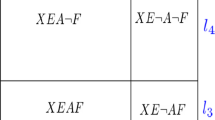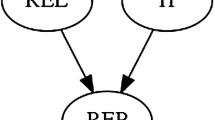Abstract
Critics of reliability theories of epistemic justificationoften claim that the `generality problem' is an insurmountabledifficulty for such theories. The generality problem is theproblem of specifying the level of generality at which abelief-forming process is to be described for the purposeof assessing its reliability. This problem is not asintractable as it seems. There are illuminating solutionsto analogous problems in the ethics literature. Reliabilistsought to attend to utilitarian approaches to choices betweeninfinite utility streams; they also ought to attend towelfarist approaches to social choice situations that donot demand full aggregation of individual welfares.These analogies suggest that the traditional `single number'approach to reliability is misguided. I argue that a newapproach – the `vector reliability' approach – is preferable.Vector reliability theories associate target beliefs withreliability vectors – that is, structured collections ofreliability numbers – and construct criteria of epistemicjustification that appeal to these vectors. The bulk of thetheoretical labor involved in a reliability account of epistemicjustification is thus transferred from picking a uniquereliability number to constructing a plausible criterionof epistemic justification.
Similar content being viewed by others
REFERENCES
Alston, W. P.: 1993, ‘Epistemic Desiderata’, Philosophy and Phenomenological Research 53(3), 527–551.
Alston, W. P.: 1995, ‘How to Think about Reliability’, Philosophical Topics 23(1), 1–29.
Brandom, R.: 1998, ‘Insights and Blindspots of Reliabilism’, Monist 81(3), 371–392.
Chang, R. (ed.): 1997, Incommensurability, Incomparability, and Practical Reason, Harvard University Press, Cambridge, MA.
Conee, E. and R. Feldman: 1998, ‘The Generality Problem for Process Reliabilism’, Philosophical Studies 89(1), 1–29.
Goldman, A. I.: 1992, ‘What is Justified Belief?’, in Liaisons: Philosophy Meets the Cognitive and Social Sciences, MIT Press, Cambridge, MA, pp. 105–126. First appeared in Pappas (1979).
Heller, M.: 1995, ‘The Simple Solution to the Problem of Generality’, Noûs 29(4), 501–515.
Herman, B.: 1993, The Practice of Moral Judgment, Harvard University Press, Cambridge, MA.
Lyons, D.: 1965, Forms and Limits of Utilitarianism, Clarendon Press, Oxford.
Nell, O.: 1975, Acting on Principle: An Essay on Kantian Ethics, Columbia University Press, New York.
Pappas, G. S. (ed.): 1979, Justification and Knowledge: New Studies in Epistemology, Vol. 17 of Philosophical Studies Series in Philosophy, D. Reidel, Dordrecht.
Plantinga, A.: 1993, Warrant and Proper Function, Oxford University Press, New York.
Pollock, J. L.: 1986, Contemporary Theories of Knowledge, Rowman & Littlefield, Totowa, N.J.
Rawls, J.: 1971, A Theory of Justice, Harvard University Press, Cambridge, MA.
Segerberg, K.: 1976, ‘A Neglected Family of Aggregation Problems in Ethics’, Noûs 10(2), 221–244.
Sen, A. K.: 1981, ‘Plural Utility’, Proceedings of the Aristotelian Society, Vol.81, pp. 193–215.
Sen, A. K.: 1982, ‘Interpersonal Aggregation and Partial Comparability’, in Choice, Welfare and Measurement, Blackwell, Oxford, pp. 203–221.
Vallentyne, P. and S. Kagan: 1997, ‘Infinite Value and Finitely Additive Value Theory’, J. Philosophy 94(1), 5–26.
Author information
Authors and Affiliations
Rights and permissions
About this article
Cite this article
Wunderlich, M.E. Vector Reliability: A new Approach to Epistemic Justification. Synthese 136, 237–262 (2003). https://doi.org/10.1023/A:1024791403375
Issue Date:
DOI: https://doi.org/10.1023/A:1024791403375




